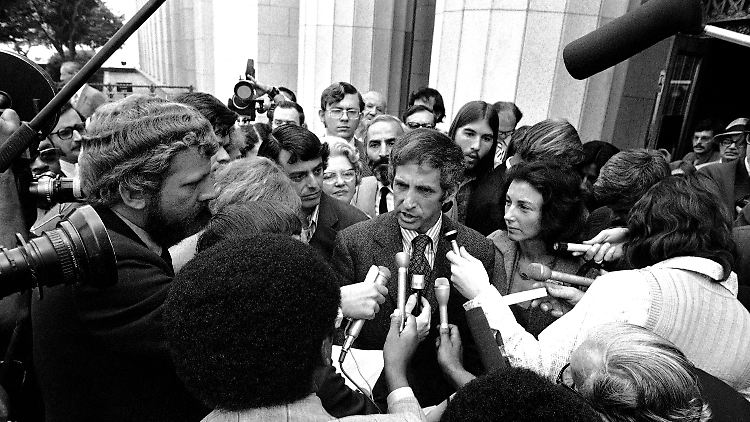“Most Dangerous Man in America”
Pentagon Papers whistleblower Ellsberg has died
06/16/2023, 11:30 p.m
Daniel Ellsberg unveils a 7,000-page document in the early 1970s because he believes the Vietnam War cannot be won. He makes many enemies and has to go through a trial. Decades later, he is still politically active. Ellsberg has now died at the age of 92.
The US whistleblower Daniel Ellsberg, known for piercing the “Pentagon Papers” on the Vietnam War, is dead. He died “peacefully” on Friday at the age of 92 at his home in Kensington, California, as a result of pancreatic cancer, as did his family communicated. Ellsberg made his illness public in March and said that his doctors said he had no more than six months to live.
Ellsberg was charged with violating an espionage law – but the charges were eventually dropped.
(Photo: picture alliance / ASSOCIATED PRESS)
“Daniel was a seeker of truth and a patriotic truth teller, an anti-war activist, a beloved husband, father, grandfather and great-grandfather, a dear friend to many and an inspiration to countless others,” the family said. “We will all miss him very much.”
Ellsberg was one of the most famous whistleblowers in history. The former Pentagon employee worked for the Rand Corporation think tank when, in 1971, he first leaked parts of a top-secret document from the US Department of Defense to the New York Times – the Pentagon Papers on the Vietnam War. The approximately 7,000-page document showed that US governments had lied to the public and Congress about operations in the war.
Nixon and Kissinger were furious
Ellsberg did not consider the Vietnam War to be winnable and hoped that the publication of the document would bring about a quicker end to the fighting. The government of US President Richard Nixon reacted angrily, Nixon’s National Security Advisor Henry Kissinger described Ellsberg as the “most dangerous man in America”.
Ellsberg turned himself in to justice. He was charged with violating an espionage law and put on trial. In 1973, however, a judge dismissed the charges, among other things, because of illegal collection of evidence by the government.
“When I copied the Pentagon Papers in 1969, I had every reason to believe that I would spend the rest of my life behind bars,” Ellsberg said in March of this year when he revealed his cancer. “It was a fate I would gladly have accepted if it meant hastening the end of the Vietnam War.”
Politically active until his death
Ellsberg has been an author, speaker and anti-war activist for the past few decades. He is one of the co-founders of the non-governmental organization Freedom of the Press Foundation, which campaigns for press freedom.
According to him, he was diagnosed with inoperable pancreatic cancer on February 17. His doctors told him he only had “three to six months to live,” Ellsberg wrote in early March. He decided against chemotherapy.
His wife and children said on Friday that Ellsberg passed away “without pain and surrounded by loving family”. In the months after his diagnosis, he spoke in numerous interviews, among other things, about the danger of a nuclear war from the Ukraine war. He also experienced “moments of joy and love”, including his 92nd birthday in April and the 85th birthday of his wife Patricia.
“He was thrilled to be able to go off the salt-free diet his doctor prescribed five years ago,” the family said. “Hot chocolate, croissants, cakes, poppy seed bagels and smoked salmon have given him extra pleasure these past few months.” Ellsberg has also rewatched several of his favorite films, including his all-time favorite, the Western Butch Cassidy and the Sundance Kid.
In view of the numerous donations in his last days, Ellsberg joked: “If I had known that dying would be like this, I would have done it earlier.” His wife replied: “Then I’m glad you didn’t do it.”
